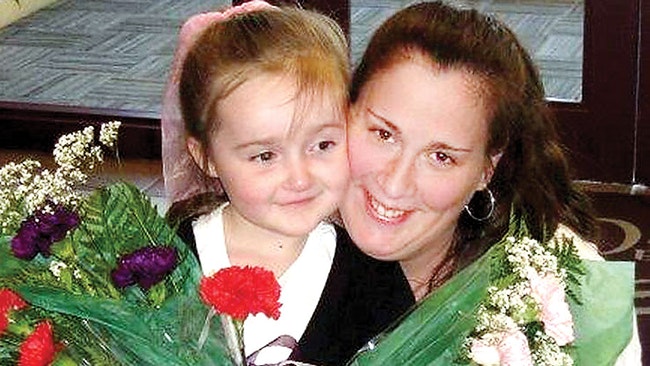
Annita Harmon hugs her daughter in this photo provided by the family. She was killed in 2017 by Anthony Montwheeler, who pleaded guilty Feb. 26, 2021, to the crime. (Contributed photo)
VALE – Susan Harmon said she isn’t satisfied.
The Weiser resident and mother of Annita Harmon, stabbed and killed more than four years ago, said last week she is glad the case of Anthony Montwheeler is over but doesn’t feel his sentence matches the crime.
Montwheeler, 53, pleaded guilty to second-degree murder, first-degree manslaughter and third-degree assault after a settlement conference Friday, Feb. 26. Under the plea agreement, Montwheeler will be sentenced to life in prison with a possibility for parole after 25 years.
According to police and court filings, Montwheeler kidnapped Harmon early on Jan. 9, 2017, as she drove to her job in Fruitland, binding her with zip ties and driving to Ontario to a gas station. In front of witnesses, he stabbed the 40-year-old mother to death as she sat restrained in the pickup truck he was driving.
Pursued by police, Montwheeler accelerated to an estimated 90 mph on the ice-covered highway, pulling into oncoming traffic and colliding head-on with another vehicle. Vale residents David Bates, then 38, and his wife, Jessica, then 35, were on their way to jobs at Saint Alphonsus Medical Center. The collision killed David Bates and seriously injured Jessica.
Montwheeler’s guilty plea caps a legal saga that has seen him again test the state’s ability to handle claims of insanity. This time, Montwheeler will go to prison, not the Oregon State Hospital as he had for earlier crimes.
“It means it’s settled and that is a relief that we don’t have to deal with that,” said Susan Harmon.
Harmon said she hoped Montwheeler “has a miserable life.”
“He slit my daughter’s throat, he kidnapped her, he was stabbing her before he sliced her throat. She had to go through all of that knowing she was going to die, and he gets to sit in a cell,” said Harmon.
Jessica Bates didn’t respond to a message seeking comment.
Montwheeler is scheduled to be sentenced March 19 in Malheur County Circuit Court.
All about the victims
Dave Goldthorpe had been at work as the Malheur County district attorney for four days when Montwheeler committed his crimes.
A series of epic snowstorms pounded the local area and Goldthorpe told his staff to stay at home and off the roads. He was alone in his office when the phone rang the morning of Jan. 9.
When he picked up the phone, Goldthorpe became the custodian of the county’s death penalty case against Montwheeler. He might not have known it then, but Goldthorpe would spend the next four years watching the case meander through the Oregon judicial system as court dates were set, and then rescheduled and Montwheeler was in and out of the state hospital for mental evaluations.
Last week Goldthorpe declined to talk about the guilty plea, saying he didn’t want to take attention away from the victims.
“The victims are the ones that matter,” he said.
Goldthorpe said relatives of Bates and Harmon will be able to address Montwheeler at the sentencing hearing.
“That is the most important part of the case for victims. They get to make their statements,” said Goldthorpe.
Harmon said she is unsure if she will attend and address her daughter’s killer.
“I’m not sure it’s going to be worth the effort because whatever is told to him isn’t going to make a bit of difference,” said Harmon.
A long and winding road
Montwheeler, who has been held in Malheur County Jail for most of the past four years awaiting trial, is no stranger to the justice system.
In 1997, he was found guilty except for insanity for kidnapping his then wife and son in Baker City. Rather than a prison sentence, Montwheeler was put under the jurisdiction of the state Psychiatric Security Review Board for 70 years.
He was released once, convicted of new crimes, and returned to the Oregon State Hospital in 2014 under the provisions of the Baker County case.
Montwheeler subsequently insisted he had faked his mental illness all along to avoid prison. A state psychiatrist reviewed the matter, testifying that there was no evidence Montwheeler was mentally ill.
But state psychologist Brian Hartman warned the board.
“His risk of violence would be high and it would be most likely to target his intimate partner or other family member,” Harman told the state board.
On Dec. 14, 2016, the Security Review Board freed Montwheeler, finding it no longer had the legal authority to hold someone not proven mentally ill.
Less than a month later, Montwheeler set off on his deadly rampage for which there has yet to be an explanation.
Jessica Bates recovered from her injuries and adjusted to life as a single parent of five children. She later sued state authorities to contend they had wrongly let Montwheeler go. The state fought the claims, and a judge dismissed the case.
Annita Harmon’s family also turned to state courts to hold the state accountable for Montwheeler. In that instance, too, the state fended off the suit, getting it dismissed.
Meantime, Montwheeler recovered from his own injuries in the crash and descended into a judicial labyrinth.
Just over three months after the Jan. 9 crime, Goldthorpe asked that Montwheeler be evaluated for fitness to face trial after his attorneys raised the prospect of an insanity defense.
In June 2017, a judge ordered Montwheeler to the state hospital for the evaluation because of doubts he could help in his own defense. Montwheeler was sent to the state hospital in September 2017 and in January 2018, the state hospital reported to the court that Montwheeler wasn’t fit for trial because he was depressed over his situation. The state hospital report said treatment would restore him.
In January 2019, Multnomah Circuit Judge Tom Ryan judged Montwheeler was mentally capable of helping in his own defense and the following month Montwheeler pleaded not guilty to all the charges.
His attorneys threw up a blizzard of filings, attempting to suppress evidence, limit the prosecution’s case and get the trial moved to another county. Ryan kept the trial in Vale and set the schedule, first for September 2019 and then July 2020.
The Covid pandemic scuttled the July 2020 trial date and Ryan rescheduled court proceedings to February.
In September, Montwheeler’s attorneys requested a settlement conference, a move designed for the state and the defense to determine if a plea could be possible.
Under terms of the plea deal to be presented to Ryan later this month, Montwheeler will get a life sentence for killing Harmon but be eligible for parole in 25 years – when he is 78. But he would have to serve another 10 years of the 20-year sentence he has agreed to for Bates’ death. He would also get a three-year sentence for injuring Jessica Bates, to be served as part of the overall sentence.
While the criminal case will be resolved, Susan Harmon remains bitter that the state hasn’t accepted responsibility.
“The fact that Oregon let him go when he clearly should not have been dismissed from the mental hospital is just another unbelievable thing that occurred,” said Harmon.
News tip? Contact reporter Pat Caldwell at [email protected].
Previous coverage:
Timeline: Anthony Montwheeler’s long, legal road
Montwheeler won’t face death penalty
Judge declares Montwheeler fit, schedules plea on murder, other charges
State moves to stop family lawsuits in Montwheeler case
YOU CAN SUPPORT THIS KIND OF WORK
The Enterprise relies on community support to fund vital local journalism. You can help us do more.
SUBSCRIBE: A monthly digital subscription is $5 a month.
GIFT: Give someone you know a subscription.
ONE-TIME PAYMENT: Contribute, knowing your support goes towards more local journalism you can trust.




